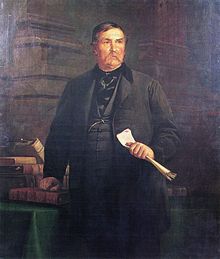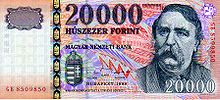Ferenc Deák (politician)
Ferenc Deák [ ˈfɛrɛnʦ ˈdɛaːk ] (born October 17, 1803 in Söjtör , Zala County ; † January 28, 1876 in Budapest ) was a Hungarian politician who initiated the 1867 settlement between Hungary and Austria .

Life
Origin and education
He was the sixth child of Ferenc Deák the Elder and Erzsébet Sibrik, who died in childbirth. In accordance with the customs of the time, the newborn was baptized on the same day in St. Jacob's Church in Söjtör. Since the father could not stand the sight of the child, the boy was raised in Zalatárnok by his uncle, József Deák, until 1808 . In 1808 the father died too, so the siblings took over the upbringing of little Ferenc. Deák had five siblings, three of whom - Antal , Jozefa and Klára - lived through adulthood.
He attended school in Keszthely (1811/12), Pápa (1812/13 Royal Lower Grammar School of the Benedictines ) and Nagykanizsa (1813/17 Piarist High School).
In the autumn of 1817 he enrolled at the Royal Academy of Sciences in Győr . From 1817-1819 he studied at the Philosophical Faculty, his teachers were Mór Czinár, Bonifác Maár and the dean György Fejér. Ferenc Deák was friends with Ignácz Rohonczy , from whom he later kept his distance because Rohonczy held a high position in the administration during the time of the passive resistance. His friendship with the politician János Zichy and the theologian Miklós Sárkány lasted a long time. He completed his two-year law internship in Pest . At the end of 1823 Deák received his law degree.
In his free time, Ferenc Deák read a lot and studied Hungarian legal and constitutional history. In literature he preferred the poetry of Dániel Berzsenyi and Sándor Kisfaludy , but he preferred the works of Mihály Vörösmarty , with whom he even corresponded and with whom he later cultivated personal contact and friendship. Even at a young age - he was not even thirty - he suffered from heart disease, which he had cured in Balatonfüred .
In 1839 the Hungarian Academy of Sciences elected him a member, and in 1855 he became its president.
politics
Between 1824 and 1832 he held the post of Honorary Public Prosecutor in Zala County and was the clerk of the Orphans Committee. In 1833 he replaced his brother, Antal Deák , as envoy to the Hungarian Parliament in Pressburg , who recommended him with the following words: "I am sending you a young man instead of me, whose little finger contains more knowledge than me as a whole." In the state parliament he belonged to the opposition . He campaigned for the rights of farmers, fought for freedom of expression and religion, and for the abolition of the death penalty . Deák welded the liberal opposition into one party and became its leading speaker. He was the envoy of Zala County in the state assemblies of 1832/36 and 1839/40. In 1848 he became Minister of Justice in the first Hungarian government.
When the revolution turned into a struggle for freedom, he tried to mediate between the Hungarian government and the Viennese court. After the failed negotiations, he withdrew to his estate in Kehidakustány . After the suppression of the struggle for freedom , he announced the policy of passive resistance . In 1854 he sold the land in Kehidakustány and moved to Pest. At the Reichstag convened in Pest in 1861, he participated as envoy for downtown Pest. His main supporters and supporters were József Eötvös and István Széchenyi .

On April 15, 1865, his famous article appeared in the newspaper “ Pesti Napló ”, which set the negotiations on the 1867 settlement in motion. Compensation is seen as Deák's work because it has shaped him significantly. Lajos Kossuth , the exiled politician, wrote an open letter to Ferenc Deák in which he described the settlement as the decline of the Hungarian nation. Because of its content, this letter is known in Hungarian history as Kossuth's “ Kassandra letter”. The Austrian Emperor, Franz Joseph I , was crowned Apostolic King of Hungary on June 8, 1867 as a result of the Compromise . The Prime Minister of the newly established Hungarian government was Count Andrássy . At his own request, Deák did not take up a post in the government or in the ruling party named after him.
In the years after the Compromise he played an important role in drafting the civil code, but later he withdrew more and more from public life.
Ferenc Deák was influential not only in Hungary but also in Europe. The liberal spirit of its laws had a great impact on European legislation. The Irish Constitution of 1937 is based on the law of 1867 by Ferenc Deák.
On January 28, 1876 Deák died in Budapest of a heart condition. His body was laid in a state funeral on behalf of the Hungarian Diet in the pillared hall of the building of the Hungarian Academy of Sciences . Empress Elisabeth (in her capacity as Queen of Hungary) was present and personally said goodbye to the deceased, whom she held in high esteem and with whom she was on friendly terms. Then Deák was buried in the Kerepesi temetö cemetery at Fiumei út in Budapest. A mausoleum was later built over his grave .
Because of his cleverness and political foresight, he received the epithet ornans from posterity : "The wise man from home" ( Hungarian " a haza bölcse ").
In 1866 the Deák Ferenc tér , a busy square in downtown Pest and today the central hub of the Budapest metro network, was named after him. In 2014 the asteroid (68114) Deákferenc was named after him. Deák can also be seen on the 20,000 forint note.
The anecdotes told by and about him are still known today. But he said about it: "I am said to have many anecdotes, but I feel the same way with them as with the Buda bitter water, which is called Ferenc Deák water: it neither belongs to me nor do I live with it."
plant
- Contributions to Hungarian constitutional law , 1865
literature
- Constantin von Wurzbach : Deák, Franz von . In: Biographisches Lexikon des Kaiserthums Oesterreich . 3rd part. Typogr.-literar.-artist publishing house. Establishment (L. C. Zamarski, C. Dittmarsch & Comp.), Vienna 1858, pp. 185–187 ( digitized version ).
- Deák Franz von. In: Austrian Biographical Lexicon 1815–1950 (ÖBL). Volume 1, Verlag der Österreichischen Akademie der Wissenschaften, Vienna 1957, p. 172.
- Emanuel Kónyi: The speeches of Franz Déak , 6 volumes 1881, 2nd edition 1903
- I. Fazekas, S. Malfèr, P. Tusor (eds.): Széchenyi, Kossuth, Batthyány, Deák. Studies on the Hungarian reform politicians of the 19th century and their relations with Austria , publications by Hungarian historical research in Vienna, Vol. 3, Collegium Hungaricum, Vienna 2011, ISBN 978-963-88739-6-5 .
Web links
- Literature by and about Ferenc Deák in the catalog of the German National Library
Individual evidence
- ^ Béla K. Király: Ferenc Deak . Twayne Publisher, Boston 1975, p. 24.
- ↑ Peter F. Sugar (Ed.): A history of Hungary. Indiana University Press, Bloomington 1990, ISBN 0-253-20867-X , p. 249.
- ↑ Minor Planet Circ. 88406
| personal data | |
|---|---|
| SURNAME | Deák, Ferenc |
| ALTERNATIVE NAMES | Deák, Franz |
| BRIEF DESCRIPTION | Hungarian lawyer and politician |
| DATE OF BIRTH | October 17, 1803 |
| PLACE OF BIRTH | Söjtör |
| DATE OF DEATH | January 28, 1876 |
| Place of death | Budapest |



